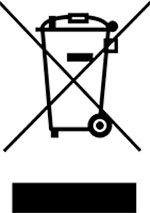WEEE and RoHS
Waste Electrical and Electronic Equipment (WEEE) and Restriction of the use of certain Hazardous Substances (RoHS) are examples of linked legislation that originated in the European Union (EU) and were published simultaneously. These Directives have similar scopes and concern electrical and electronic equipment. The WEEE Directive is aimed at reducing the amount of waste electrical and electronic equipment destined for landfill, whereas the RoHS Directive is aimed at avoiding certain hazardous substances in new electrical and electronic equipment.
Since their inception in the EU in 2006, several similar laws have been implemented around the world.
WEEE
This law requires producers like Kodak Alaris to be responsible for their Electrical and Electronic Equipment (EEE) when they finally become wastes, known as End of Life (EOL). Producer responsibility includes meeting labelling requirements, providing information to end-users and treatment facilities, ensuring the availability of collection infrastructure, submitting sales and recovery data and financing WEEE costs. In some markets around the world this is managed by contractual arrangements with distributors or customers.
Kodak Alaris, like other electronic companies, is working with design teams, suppliers, and other partners to maximize the reuse and refurbishment of its EEE, especially in Europe. Where this is not possible our equipment can be treated at EOL using common waste treatment technologies.
Country Specific
WEEE Dustbin Symbol
 In the European Union, this symbol indicates that when the last user wishes to discard this product, it must be sent to appropriate facilities for recovery and recycling. Some newer equipment won`t necessarily have the solid black underscore.
In the European Union, this symbol indicates that when the last user wishes to discard this product, it must be sent to appropriate facilities for recovery and recycling. Some newer equipment won`t necessarily have the solid black underscore.
Information for Recyclers
All Kodak Alaris EEE is designed to meet global RoHS requirement such that the use of hazardous substances is minimized as far as reasonably practicable to safeguard workers in the treatment industries and reduce the impact on the environment. Our EEE manuals contain information on the design of the products.
Kodak Alaris places a variety of EEE on the global market. For examples, picture kiosks, order stations, drylabs, card readers, thermal printers, scanners and common computing components. All can be recycled using commonly available technologies.
If any recycler has any concerns or questions, please email us at EHS-Questions@Kodakalaris.com and we will aim to answer you anywhere in the world.
RoHS
Certain hazardous substances are restricted by law in electrical and electronic equipment (EEE) above a threshold. Kodak Alaris is compliant with the requirements of all RoHS legislation around the world. Countries with RoHS laws in addition to the EU Members States, include Korea, Japan, China and Turkey.